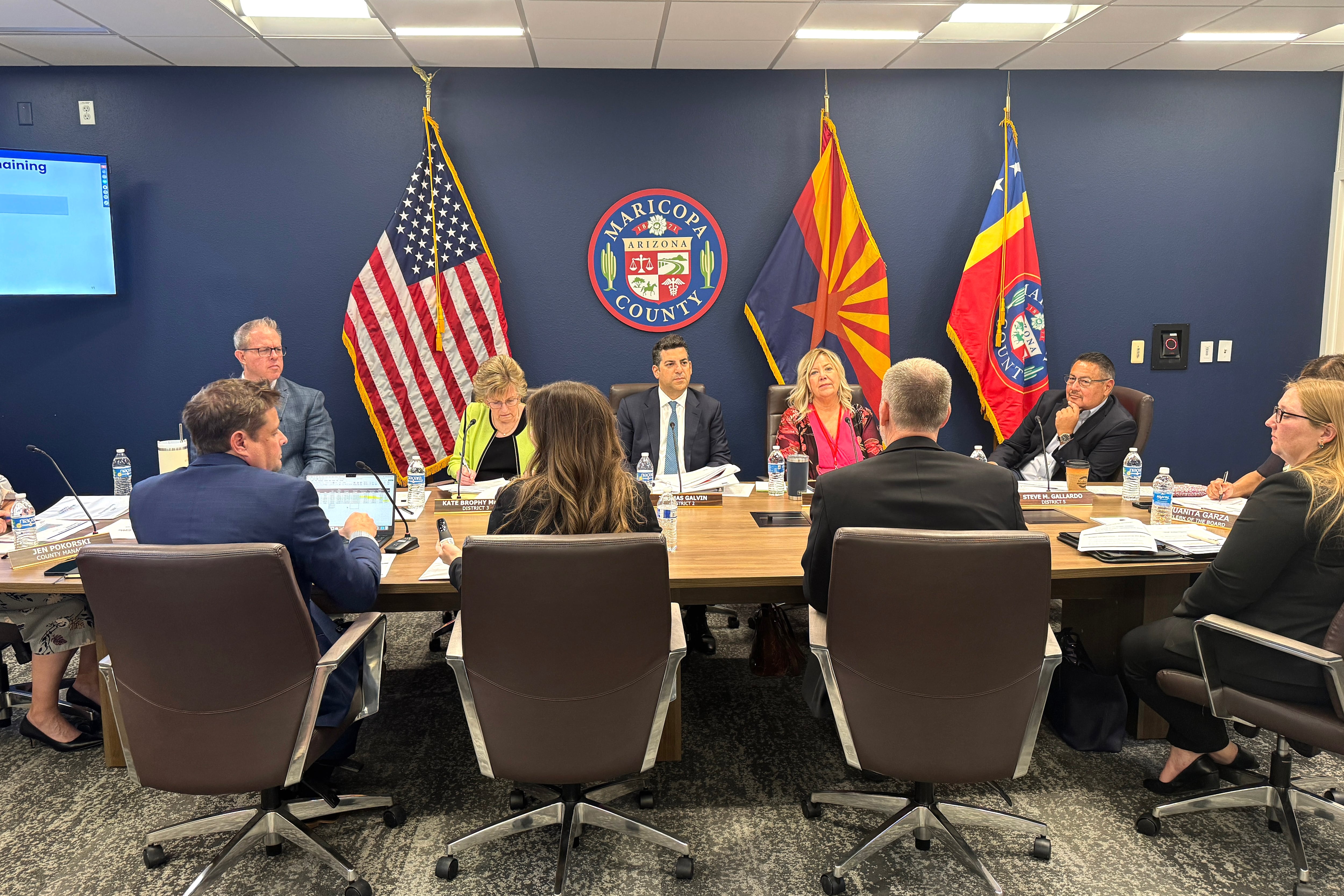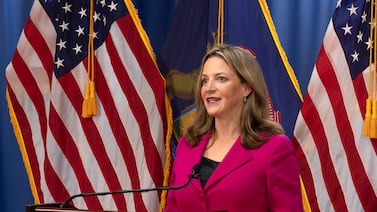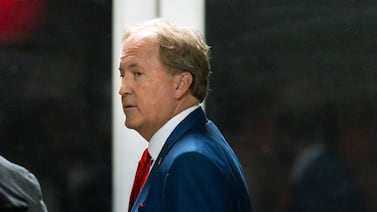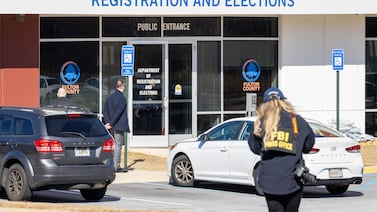Votebeat is a nonprofit news organization reporting on voting access and election administration across the U.S. Sign up for Votebeat Arizona’s free newsletter here.
Maricopa County Recorder Justin Heap privately pleaded with two county supervisors to support his bid for more power over the county’s elections, text messages obtained by Votebeat show.
The messages, which county supervisors provided to Votebeat in response to a public-records request, include previously unreported behind-the-scenes conversations and confrontations as Heap negotiated with the supervisors board early this year over how to divide election duties in the closely watched swing county.
“I really thought you guys would come through for me,” Heap wrote to Supervisor Mark Stewart, a fellow Republican, in March after a counterproposal from the supervisors. “This was the last straw for me, Mark.”
Heap sued supervisors in June after the negotiations over an agreement governing the division of election duties fell apart. County supervisors countersued this month, and the lawsuit is pending in county court. The breakdown means that as the time to start preparing for next year’s midterm elections approaches, the division of duties between the recorder and supervisors remains in dispute.
With pressure on the county to pull off smooth and fair elections, the texts provided a glimpse into how the working relationship between the two offices in charge of elections has degenerated.
The full extent of Heap’s private exchanges is still unknown. Heap so far has not released any texts he sent from his personal cellphone in response to a similar public-records request.
His office initially said he had no responsive records. After a lawyer for Votebeat noted that texts turned over by supervisors included texts from Heap, Maricopa County Deputy Attorney Joseph La Rue said in a July 1 letter that Heap intended to “promptly” respond by July 14.
When Heap did not do so, Votebeat’s lawyer, Matthew Kelley of Ballard Spahr, sent another letter Tuesday demanding the release of the records by July 31 to avoid litigation that he said is highly likely to result in the ultimate release of the records, and the county paying Votebeat’s attorneys fees.
In response to a request for comment for this article, Heap’s chief of staff, Sam Stone, said that Heap has “compiled the information” and the county will release it by July 31, the final deadline given in Kelley’s letter.
The texts provided by supervisors show that Heap knew the records could become public.
“Hopefully you and I don’t receive Public Recorders Requests from journalists for our personal cell phones tomorrow,” Heap wrote to Maricopa County Supervisor Debbie Lesko in April — a day after Votebeat submitted its request — referring to records requests.
Heap claimed support from Democratic supervisor
Texts provided by Stewart and Lesko, both Republicans, show how Heap pressured them to go around Supervisors Chairman Thomas Galvin, the Republican leading the negotiations with Heap, and instead work with the lone Democrat on the board, Steve Gallardo, to approve the elections agreement he wanted.
According to the texts, Heap said he had gained Gallardo’s support for the deal, known as a shared services agreement, or SSA.
“Don’t ask me the kind of backchanneling and arm twisting I had to do to get the democrat on the Board, but he will vote for the SSA I proposed with you and Debbie,” he texted Stewart in March.
In a group text with Lesko and Stewart a week later, he reminded them that “if push comes to shove, you have 3 votes.”
Gallardo told Votebeat that he never agreed to support Heap’s proposal, and called the claim “total lies.” He said he has met with or spoken with Heap and his staff only once in an introductory meeting after Heap took office, and they did not discuss the shared services agreement.
The texts reference two previously unreported in-person confrontations that show how heated the discussions became.
One of them, as recounted by Heap, involved Stone, his chief of staff, and Galvin’s chief of staff as the recorder and supervisors fought behind the scenes about office space and the agreement.
Stone was walking into the building and passed Galvin’s chief of staff “who, without provocation, launched into an F@%$ word-laced screaming tirade. Are you guys ok up there?” Heap texted Lesko and Stewart in early April. Lesko and Stewart did not reply.
Galvin declined to comment on the interaction, or Heap’s text messages.
Stone did not comment about Heap’s text messages to the supervisors in his response to Votebeat Tuesday.
How relations between Heap and supervisors broke down
Heap was elected in November 2024 after campaigning on the idea that the county’s elections were broken, and on a promise to fix the problems. Because Stewart and Lesko also campaigned on election integrity platforms, he thought they would be allies.
It hasn’t worked out that way.
In January, Heap rejected the elections agreement that had been signed by the prior recorder and supervisors. He claimed publicly that the supervisors had stolen his control over elections, even though the changes they made were fairly limited in scope, such as transferring control of the elections IT staff to the supervisors.
Heap and his allies took aim at Galvin, whose office began getting complaints by phone. They included a 30-second voicemail message referring to “election problems out of Arizona” and using “threatening language” against Galvin, according to Jason Berry, a county spokesperson. The office referred that message and an emailed threat to the Maricopa County Attorney’s Office for investigation, Berry said. He declined to share additional details, and the investigation is ongoing.
Around the same time, Heap and Stewart were discussing the negotiations by text message, according to texts Stewart provided from his personal phone.
“We will get there,” Stewart told Heap in February, as Heap became more frustrated with the negotiations. “You and I need to continue to lead by example and be statesmen.”
Stewart said in an interview with Votebeat that throughout his private conversations with Heap, he was trying to act as a liaison between the recorder and Galvin, and he wasn’t trying to go around Galvin.
“It was important for me to keep discussions professional, solution-oriented, and ultimately conduct meetings transparently while respecting leadership roles and maintaining open communication,” he said. “Sometimes, open meeting law gets in the way of that. I still feel hopeful that we can get to a resolution without the courts.”
After supervisors met in executive session in March to discuss the agreement, Stewart texted Heap that in the “meeting yesterday, as for the past three months I did my best to guide things back to the 2023 agreement, and I think we’re there.”
The day after that text, Heap got the supervisors’ new proposal. But he wasn’t satisfied with it. He texted Stewart asking if it was “a joke,” and said it “feels like a massive middle finger.”
“I let my trust in you and Debbie, and my wish to protect you from the political fallout to lull me into to believing this could be resolved amicably without a lawsuit,” Heap wrote to Stewart, adding that Stewart had been “played” by Galvin.
Supervisors’ messages suggest agreement was close
Another turning point in Heap’s relationship with supervisors came in early April, in a dispute over an employee who reported to the supervisors, but had an office on Heap’s floor in the county executive building.
Heap said in texts to Lesko and Stewart that he had the employee’s belongings removed to a nearby space because he believed the employee was relaying his team’s discussions about the negotiations to the supervisors’ lawyer, records show.
Supervisor Kate Brophy McGee told Votebeat that when she found out that the employee’s work items had been moved, she accompanied the county manager and other staff to rekey the employee’s office. That led to a confrontation between her and Heap, she said.
Text records show Heap later characterized it to Lesko and Stewart as Brophy McGee coming to his office with “armed security” and intimidating a staff member over the move. “Now the whole floor is a buzz with rumors which are likely to spill out,” Heap wrote.
Brophy McGee said in the interview that she did not mistreat any staff, but that she questioned Heap because she believed he was wrongly involving an employee in the negotiation drama.
“I said to Justin directly, he and I are politicians and we sign up for it, but our Maricopa County staff does not,” she said.
A day later came the heated exchange between the two chiefs of staff.
Still, the two sides came close to an agreement in an April 11 meeting, according to the text messages released to Votebeat. But then Heap suddenly fired the lawyer he had been working with, and negotiations stalled.
At that point, Lesko said, she was frustrated with Heap, and believed that Heap was being misleading in community meetings about the supervisors’ willingness to negotiate. So, during two separate public meetings, Lesko read aloud a text Heap had sent her about how close he believed they were to an agreement.
That’s when, records show, Heap texted Lesko and told her to stop reading his private texts in public, adding that he hoped reporters wouldn’t request access to their messages.
The records don’t show any response from Lesko.
Jen Fifield is a reporter for Votebeat based in Arizona. Contact Jen at jfifield@votebeat.org.






